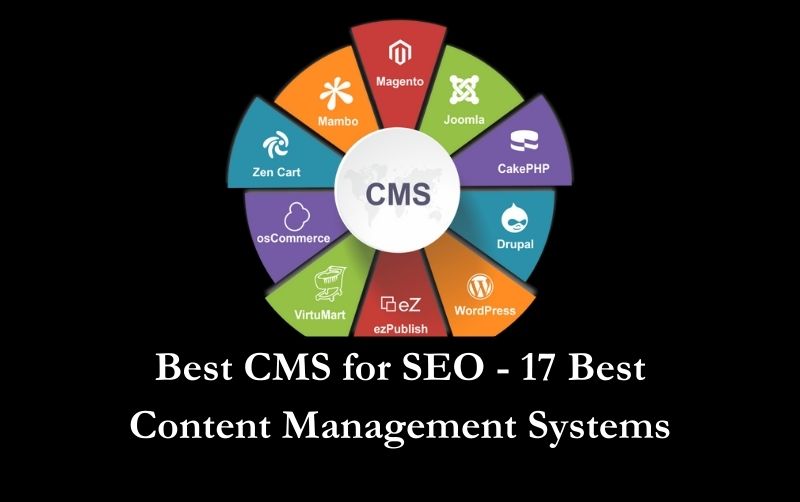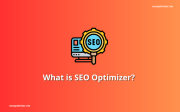Best CMS for SEO - 17 Best Content Management Systems

What is CMS for SEO?
CMS stands for Content Management System, and it refers to a software application or a set of related programs that are used to create and manage digital content. CMS is importn for SEO (Search Engine Optimization) because it allows website owners and content creators to easily update and organize their content without needing extensive technical knowledge.
So, the CMS you chose to use can significantly impact a site's search engine rankings, user experience, and overall performance.
10 Best Content Management Systems (CMS) for SEO
1. WordPress:
WordPress is one of the best cms for seo. It is the most popular and widely used CMS globally, and for good reason. Its user-friendly interface, extensive plugin library, and customizable themes make it a top choice for SEO enthusiasts. WordPress allows users to optimize their content easily with SEO-friendly URLs, meta tags, and image alt attributes. The platform's open-source nature and active community ensure constant updates and improvements, staying ahead of the curve in SEO trends.
Wordpress Pros:
- WordPress has intuitive interface, making it easy for beginners to navigate.
- The vast array of plugins allows users to add features and functionalities seamlessly.
- The large and active community ensures ongoing support, updates, and a wealth of resources.
Wordpress Cons:
- The popularity of WordPress makes it a target for security threats, necessitating regular updates and security measures.
- Advanced customization may require knowledge of coding, potentially challenging for non-developers.
You can visit WordPress official website at https://wordpress.org/
Read also: Advantages of Purchasing an Aged Domain Name for SEO
Also read: Complete Guide to SEO Poisoning & How to Avoid it
Also read: 15 Most Popular Search Engines
2. Wix:
Wix is a user-friendly website builder that has gained popularity for its drag-and-drop interface and visually appealing templates. It is also s one of the best cms for seo. While it may not be as powerful as some of its counterparts, Wix still offers decent SEO capabilities. Users can customize meta tags, URL structures, and optimize images for search engines. Wix's simplicity makes it an excellent choice for small businesses and individuals looking for a quick and easy way to establish an online presence with decent SEO features.
You can visit Wix official website at https://www.wix.com/
Blogger, commonly known as Blogspot, is a free blogging platform owned by Google. While it may not be as feature-rich as some standalone CMS options, Blogger provides a straightforward and accessible way for individuals to start blogging. As part of the Google ecosystem, Blogger offers seamless integration with other Google services, contributing to potential SEO benefits. Users can customize meta tags, create simple SEO-friendly URLs, and leverage the platform's connection to Google for enhanced visibility in search results. Blogger is an ideal choice for beginners and casual bloggers looking for a hassle-free way to share their content with minimal setup.
Blogger Pros:
- Free and easy to use, ideal for beginners and casual bloggers.
- Integrated with Google services for potential SEO benefits.
- Quick setup with minimal technical knowledge required.
Blogger Cons:
- Limited customization compared to self-hosted CMS platforms.
- Relatively fewer features compared to standalone CMS options.
- Limited scalability for growing blogs or websites.
You can visit Blogger official website at https://www.blogger.com/
4. Webflow:
Webflow is one of the best cms for seo. It is a modern and visually-focused website builder that combines design flexibility with a powerful CMS. Catering to both designers and developers, Webflow allows users to create visually stunning websites with responsive designs. In terms of SEO, Webflow provides essential features such as customizable meta tags, clean URL structures, and the ability to manage redirects. The platform's intuitive interface empowers users to optimize their content without deep technical knowledge. With its focus on design and functionality, Webflow is an excellent choice for those seeking a visually appealing website without compromising on SEO capabilities.
Webflow Pros:
- Visually appealing designs with responsive layouts.
- Intuitive drag-and-drop interface for easy customization.
- Decent SEO features for basic optimization.
Webflow Cons:
- Limited customization compared to more flexible CMS platforms.
- Relatively higher learning curve for advanced customization.
- Subscription-based pricing model may be costly for some users.
You can visit Webflow official website at https://www.webflow.com/
Also read: 8 Essential Web & SEO Tools for Auditing and Monitoring Websites
Also read: 7 Steps To Grow your Domain Authority
Read also: Best Guide for Keywords Usage in SEO
5. Drupal:
Drupal is a robust and flexible CMS that caters to both beginners and experienced developers. Known for its scalability and high-level security, Drupal is an excellent choice for large and complex websites. With its modular architecture, Drupal allows users to create SEO-friendly content structures and offers advanced SEO features such as customizable meta tags, clean URLs, and easy content revision management.
Drupal Pros:
- Drupal excels in handling large and complex websites, making it suitable for enterprises.
- The platform prioritizes security, making it a robust choice for websites with sensitive information.
- Offers advanced SEO tools and capabilities for optimized content management.
Drupal Cons:
- The steeper learning curve may be challenging for beginners or those without technical expertise.
- While available, the selection of themes and plugins is not as extensive as in WordPress.
You can visit Drupal official website at https://www.drupal.org/
6. Joomla:
Joomla is another powerful CMS that strikes a balance between user-friendliness and advanced features. It offers a range of SEO tools, including customizable URL structures, meta tag management, and header tags. Joomla's extensive extension directory allows users to enhance their site's SEO capabilities by adding various plugins and extensions. Its multilingual support also makes it an ideal choice for global websites targeting diverse audiences.
Joomla Pros:
- Joomla strikes a balance between user-friendliness and advanced features, making it adaptable to various needs.
- Ideal for websites targeting diverse global audiences with built-in multilingual capabilities.
- A supportive community ensures ongoing improvements and assistance.
Joomla Cons:
- Similar to Drupal, Joomla may have a learning curve that could be challenging for beginners.
- While extensions are available, the selection might not be as extensive as in other CMS platforms.
You can visit Joomla official website at https://www.joomla.org/
Also read: Google Indexing and How Web Crawler Works - Comprehensive Guide
Read also: Website Speed Checker - 5 Best tools For Testing Website Speed
7. Magento:
Magento is a specialized CMS designed for e-commerce websites. It allows users to manage product listings and transactions. In terms of SEO, Magento provides features like SEO-friendly URLs, sitemaps, and rich snippets for products. With its flexibility and scalability, Magento allows online businesses to optimize their websites effectively, ensuring higher visibility in search engine results pages (SERPs).
Magento Pros:
- Tailored specifically for e-commerce, Magento provides robust tools for managing products and transactions.
- Scales effectively, accommodating the growth of online stores.
- Offers features like SEO-friendly URLs and rich snippets for product optimization.
Magneto Cons:
- Magento can be complex, requiring a learning curve and potentially more significant development efforts.
- May require more server resources, impacting performance.
You can visit Magneto official website at https://magento.com/
8. Squarespace:
Squarespace is another website builder that focuses on design and simplicity. It is one of the best cms for seo. Despite being less feature-rich compared to some CMS platforms, Squarespace offers essential SEO tools. Users can customize meta titles and descriptions, create clean URL structures, and optimize images. Squarespace is an ideal choice for users who prioritize aesthetics and user experience while still maintaining basic SEO functionality.
Squarespace Pros:
- Squarespace has a visually appealing and responsive design templates.
- Provides a straightforward and user-friendly interface for content management.
- All-in-one platform with integrated hosting, simplifying website management.
Squarespace Cons:
- Squarespace may have limitations regarding third-party integrations compared to other platforms.
- Lack of open-source nature limits extensive customization.
You can visit Squarespace official website at https://www.squarespace.com/
Recommended: Social Engineering and Prevention Measures
Also read: Top 10 Tips on How to Identify Phishing Emails and Links
9. Shopify:
For those in the e-commerce sector, Shopify is a popular choice due to its ease of use and specialized features for online stores. Shopify provides built-in SEO features like customizable meta tags, mobile responsiveness, and sitemap generation. Additionally, it offers integrations with various SEO apps and plugins, enabling users to enhance their website's search engine visibility and drive more traffic to their online stores.
Shopify Pros:
- Tailored specifically for e-commerce, providing a comprehensive platform for online stores.
- Shopify offers an easy-to-use interface for setting up and managing an online store.
- Extensive app store for additional features and integrations.
Shopify Cons:
- Shopify charges transaction fees for third-party payment gateways on lower-tier plans.
- Premium themes can be relatively expensive, adding to the overall cost.
You can visit Shopify official website at https://www.shopify.com/
10. TYPO3:
TYPO3 is an open-source CMS that caters to large and complex websites with a focus on scalability and flexibility. While it may have a steeper learning curve compared to some other CMS platforms, TYPO3 excels in providing advanced SEO capabilities. Users can manage meta tags, create SEO-friendly URLs, and implement redirects seamlessly. TYPO3 is a solid choice for enterprises and organizations looking for a CMS that can handle intricate SEO requirements.
Typo3 Pros:
- TYPO3 is highly scalable, making it suitable for large and complex websites.
- Provides advanced SEO capabilities, including customizable meta tags and clean URL structures.
- Supports multilingual content for global audiences.
Typo3 Cons:
- TYPO3 has a steeper learning curve, potentially challenging for beginners.
- The community may not be as extensive as some other open-source CMS platforms.
Magneto official website at https://typo3.org/
11. Ghost:
Ghost is a CMS specifically designed for blogging, offering a clean and minimalist approach to content creation. While not as feature-rich as some other platforms, Ghost provides essential SEO tools for bloggers. Users can customize meta titles and descriptions, create SEO-friendly URLs, and optimize images for search engines. Ghost's simplicity makes it an excellent choice for individuals and small businesses focused on content marketing and blogging.
Ghost Pros:
- Specifically designed for blogging, offering a clean and minimalist approach.
- Ghost is lightweight and optimized for speed, contributing to faster loading times.
- Provides essential SEO tools for bloggers, including customizable meta tags and clean URLs.
Ghost Cons:
- Ghost may lack some features compared to multipurpose CMS platforms.
- While growing, the community may not be as extensive as larger platforms like WordPress.
Ghost official website at https://ghost.org/
Also read: 268 Popular SEO keywords
Read also: 145 SEO Abbreviations, Acronyms, and Meanings
12. ExpressionEngine:
ExpressionEngine is a versatile CMS that caters to both small websites and large-scale enterprise solutions. With its flexibility and customizability, ExpressionEngine allows users to implement advanced SEO strategies. Users can manage meta tags, create SEO-friendly URLs, and optimize content for search engines. ExpressionEngine's modular approach and robust features make it a suitable choice for businesses with unique SEO requirements.
Expressionengine Pros:
- ExpressionEngine is highly customizable, catering to unique design and functionality requirements.
- Suitable for both small websites and large-scale enterprise solutions.
- Offers advanced SEO features, including customizable meta tags and clean URL structures.
Expressionengine Cons:
- Similar to other highly customizable CMS options, ExpressionEngine may have a steeper learning curve.
- The platform is not open source and requires a license fee, which may be a consideration for some users.
Expressionengine official website at https://expressionengine.com/
13. Umbraco:
Umbraco is an open-source CMS known for its flexibility and scalability. It provides a clean and intuitive interface for content management while offering robust SEO capabilities. Umbraco allows users to easily customize meta tags, create SEO-friendly URLs, and manage redirects. Its extensibility through plugins and a supportive community make it a strong choice for businesses seeking a customizable CMS that excels in SEO performance.
Umbraco Pros:
- Umbraco is flexible and customizable, suitable for various website needs.
- Capable of handling both small and large websites effectively.
- Provides advanced SEO capabilities, including customizable meta tags and clean URL structures.
Umbraco Cons:
- Like other flexible CMS options, Umbraco may have a learning curve.
- The community may not be as extensive as more widely adopted CMS platforms.
official website at https://umbraco.com/
14. Contao:
Contao, formerly known as TYPOlight, is a CMS that emphasizes accessibility and user-friendliness. While it may not be as widely adopted as some other platforms, Contao offers solid SEO features. Users can optimize their content with customizable meta tags, clean URL structures, and efficient image management. Contao is a suitable option for businesses that prioritize ease of use without compromising on essential SEO functionalities.
Contao Pros:
- Contao emphasizes accessibility and user-friendliness, making it suitable for beginners.
- Offers essential SEO tools, including customizable meta tags and clean URL structures.
- Multilingual Support: Supports multilingual content for global audiences.
Contao Cons:
- The selection of themes and plugins may not be as extensive as in some other CMS platforms.
- The community may not be as extensive as more widely adopted CMS platforms.
official website at https://contao.org/
Read also: SEO Education - 5 Reasons Why SEO Isn't Taught in Universities
Also read: Difference Between Short and Long tailed keywords in SEO
15. MODX:
MODX is an open-source CMS that stands out for its flexibility and customization capabilities. It allows users to build highly personalized websites while offering SEO-friendly features. With MODX, users can optimize meta tags, create clean URLs, and manage their site's structure for better search engine visibility. MODX is an excellent choice for developers and businesses looking to implement unique designs and advanced SEO strategies.
MODX Pros:
- Highly customizable and flexible for various types of websites.
- Strong SEO capabilities with advanced features for optimization.
- Active community and regular updates.
MODX Cons:
- Steeper learning curve compared to more user-friendly CMS platforms.
- Limited availability of themes and plugins compared to WordPress.
- Requires technical expertise for setup and maintenance.
MODX official website at https://modx.com/
16. Craft CMS:
Craft CMS is a flexible and user-friendly platform known for its focus on content customization. It provides a clean and intuitive interface for managing content while offering SEO tools. Craft CMS allows users to create SEO-friendly URLs, manage meta tags, and optimize images for search engines. With a growing community and regular updates, Craft CMS is gaining popularity among those seeking a modern and customizable CMS with solid SEO capabilities.
Craft CMS Pros:
- Flexible and customizable with robust features for content management.
- Strong SEO capabilities for optimizing content.
- Active community and regular updates.
Craft CMS Cons:
- Steeper learning curve compared to more user-friendly CMS platforms.
- Limited availability of themes and plugins compared to WordPress.
- Requires technical expertise for setup and maintenance.
Craft CMS official website at https://craftcms.com/
17. Bolt:
Bolt is a lightweight and developer-friendly CMS that prioritizes speed and simplicity. Despite its lightweight nature, Bolt offers essential SEO features, including customizable meta tags, clean URL structures, and image optimization. Bolt is an excellent choice for developers and businesses looking for a fast and straightforward CMS that still provides the necessary tools for optimizing content for search engines.
BoltCMS Pros:
- Lightweight and fast-loading for improved performance.
- Simple interface for content management.
- Decent SEO features for basic optimization.
BoltCMS Cons:
- Limited customization compared to more flexible CMS platforms.
- Steeper learning curve for advanced customization.
- Relatively smaller community compared to more popular CMS platforms.
official website at https://boltcms.io/
Suggested Reads:
Also read: SEO for Beginners – Ultimate Guide
Also read: RoadMap to Becoming An SEO Expert
Also read: 15 Top SEO Experts and Specialists
Also read: AI SEO – The Impact of Artificial Intelligence on SEO Strategies
Also read: Google Indexing and How Web Crawler Works
What's Next –
Start SEO Optimization. Analyze your website with Free SEO Optimizer
Audit your website for Free - SEO audit free




